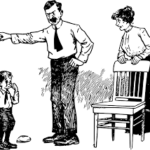Parenting often entails navigating the intricate terrain of child discipline, a realm that can be both challenging and rewarding. The quest to instill values, shape behavior, and foster a healthy parent-child relationship requires a nuanced approach. In this comprehensive guide, we delve into the heart of effective child discipline, emphasizing the stark difference between discipline and punishment.
Decoding Discipline vs. Punishment
Discipline: A Journey of Teaching
Discipline, derived from the Latin disciplina, embodies a holistic practice of guiding children to adopt desirable future behaviors. It’s about training, learning, and instructing. To discipline is to teach without resorting to punitive measures.
Punishment: A Fear-Inducing Dilemma
Contrastingly, punishment involves inflicting suffering as a consequence of past behavior. It’s a coercive tactic rooted in fear, aiming to deter undesired conduct. The distinction between discipline and punishment is crucial, transcending mere semantics.
The Intricacies of Child Psychology
Pavlov’s Insight: A Lesson for Parents
Drawing inspiration from Ivan Pavlov’s classical conditioning experiment with dogs, we recognize that humans, particularly children, are not immune to associative learning. However, the application of negative consequences in child discipline demands a more nuanced understanding.
Unraveling the Human Brain
Neurologists illuminate the three distinct brain regions: the reptilian brain overseeing survival functions, the mammalian brain dictating emotions, and the human brain governing advanced cognitive processes. Discipline engages the thinking brain, while punishment impacts the emotional brain.
Fear and the Brain: A Delicate Dance
Understanding how the brain reacts to fear is pivotal. The fight-or-flight mechanism, triggered by danger, bypasses conscious thought. Frequent exposure to fear-based punishment can have profound implications on a child’s mental well-being.
The Dark Side of Punishment: Unveiling the Risks
Mental Disorders: The Unseen Consequence
Punishment-induced fear can lead to the creation of special, fear-conditioned memories, underpinning mental disorders like depression, anxiety, and PTSD in later life. Children’s vulnerability intensifies the impact, as their caregivers represent their entire world.
Stress Hormone Elevation: A Health Tumult
Chronically elevated stress hormone levels, a consequence of frequent fear-based discipline, pose serious health risks for children. From brain shrinkage to compromised immune systems, the toll on a child’s well-being is alarming.
Emotion Dysregulation: The Unraveling Thread
Excessive fear and stress disrupt emotional regulation, fostering impulsive and aggressive behavior. Children subjected to harsh discipline struggle with emotional modulation, setting the stage for potential long-term challenges.
Bidirectional Influence: The Ripple Effect
Punishment can fuel a self-fulfilling prophecy, creating a feedback loop where a child’s negative behavior elicits punitive responses, leading to an escalation of both. The bidirectional impact may culminate in an abusive dynamic.
Externalizing Behavior: Seeds of Future Aggression
Research consistently associates harsh punishments, especially physical ones, with future aggression in children. The specter of Oppositional Defiant Disorder looms, casting a shadow on a child’s behavioral development.
Become Bullies and/or Victims: A Vicious Cycle
Children exposed to harsh punishment may perpetuate abusive behaviors or become victims themselves. The normalization of coercive discipline at home can reverberate into their social interactions, impacting relationships and self-perception.
Worse Academic Performance: A Detrimental Link
Longitudinal studies underscore the detrimental link between punitive discipline and academic performance. Environments emphasizing punitive measures correlate with lower academic achievement, highlighting the far-reaching consequences.
Effective Discipline Strategies: A Path Forward
Be a Role Model: The Mirror Neuron Effect
Harnessing the power of the mirror neuron system, parents must model the behavior they seek in their children. Respect, kindness, and empathy form the cornerstone of effective role modeling.
Use Positive Discipline and Positive Reinforcement: Shifting Perspectives
Rethinking the role of punishment, positive discipline emerges as a compelling alternative. Understanding the root causes of behavior, addressing them, and employing positive reinforcement can yield more sustainable results.
Be Consistent: The Pillar of Discipline
Consistency proves paramount in no-punishment discipline. Upholding consequences without wavering ensures a predictable environment for children, fostering a sense of security and understanding.
Reevaluate Age-Appropriateness and Parental Goals: Tailoring Discipline
Recognizing the developmental stages of children, parents must calibrate discipline approaches. Age-appropriate expectations coupled with a reassessment of parental goals form the bedrock of effective discipline.
In conclusion, effective child discipline transcends punitive measures. Embracing a holistic approach that nurtures a child’s cognitive and emotional development ensures a foundation for lifelong success. It’s not about abandoning discipline; it’s about refining and reshaping it into a positive force that propels our children toward a bright future.




